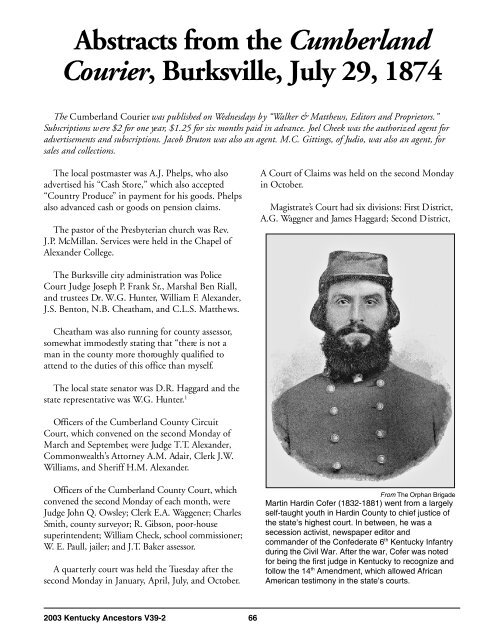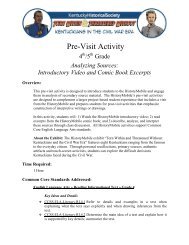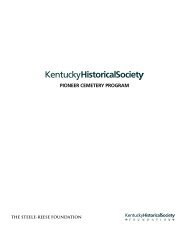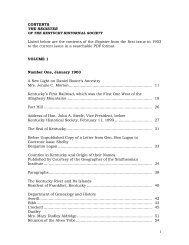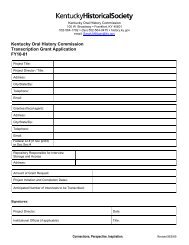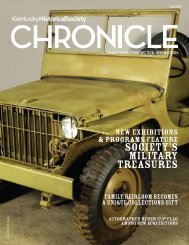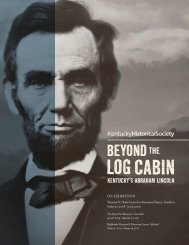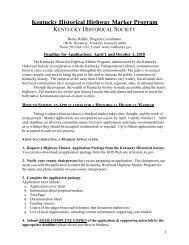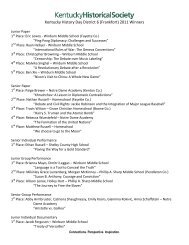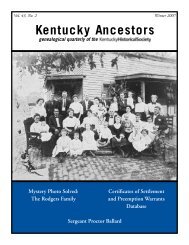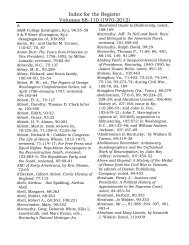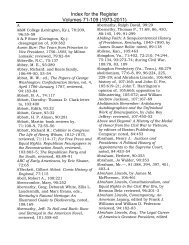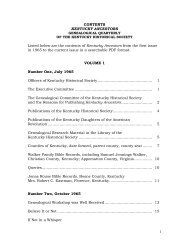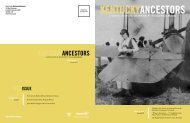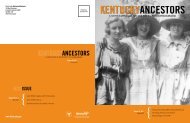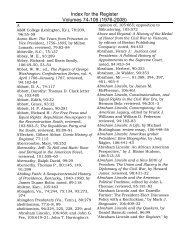Kentucky Ancestors, Volume 39, Number 2 - Kentucky Historical ...
Kentucky Ancestors, Volume 39, Number 2 - Kentucky Historical ...
Kentucky Ancestors, Volume 39, Number 2 - Kentucky Historical ...
You also want an ePaper? Increase the reach of your titles
YUMPU automatically turns print PDFs into web optimized ePapers that Google loves.
Abstracts from the Cumberland<br />
Courier, Burksville, July 29, 1874<br />
The Cumberland Courier was published on Wednesdays by “Walker & Matthews, Editors and Proprietors.”<br />
Subscriptions were $2 for one year, $1.25 for six months paid in advance. Joel Cheek was the authorized agent for<br />
advertisements and subscriptions. Jacob Bruton was also an agent. M.C. Gittings, of Judio, was also an agent, for<br />
sales and collections.<br />
The local postmaster was A.J. Phelps, who also<br />
advertised his “Cash Store,” which also accepted<br />
“Country Produce” in payment for his goods. Phelps<br />
also advanced cash or goods on pension claims.<br />
The pastor of the Presbyterian church was Rev.<br />
J.P. McMillan. Services were held in the Chapel of<br />
Alexander College.<br />
The Burksville city administration was Police<br />
Court Judge Joseph P. Frank Sr., Marshal Ben Riall,<br />
and trustees Dr. W.G. Hunter, William F. Alexander,<br />
J.S. Benton, N.B. Cheatham, and C.L.S. Matthews.<br />
Cheatham was also running for county assessor,<br />
somewhat immodestly stating that “there is not a<br />
man in the county more thoroughly qualified to<br />
attend to the duties of this office than myself.<br />
The local state senator was D.R. Haggard and the<br />
state representative was W.G. Hunter. 1<br />
Officers of the Cumberland County Circuit<br />
Court, which convened on the second Monday of<br />
March and September, were Judge T.T. Alexander,<br />
Commonwealth’s Attorney A.M. Adair, Clerk J.W.<br />
Williams, and Sheriff H.M. Alexander.<br />
Officers of the Cumberland County Court, which<br />
convened the second Monday of each month, were<br />
Judge John Q. Owsley; Clerk E.A. Waggener; Charles<br />
Smith, county surveyor; R. Gibson, poor-house<br />
superintendent; William Check, school commissioner;<br />
W. E. Paull, jailer; and J.T. Baker assessor.<br />
A quarterly court was held the Tuesday after the<br />
second Monday in January, April, July, and October.<br />
2003 <strong>Kentucky</strong> <strong>Ancestors</strong> V<strong>39</strong>-2 66<br />
A Court of Claims was held on the second Monday<br />
in October.<br />
Magistrate’s Court had six divisions: First District,<br />
A.G. Waggner and James Haggard; Second District,<br />
From The Orphan Brigade<br />
Martin Hardin Cofer (1832-1881) went from a largely<br />
self-taught youth in Hardin County to chief justice of<br />
the state’s highest court. In between, he was a<br />
secession activist, newspaper editor and<br />
commander of the Confederate 6 th <strong>Kentucky</strong> Infantry<br />
during the Civil War. After the war, Cofer was noted<br />
for being the first judge in <strong>Kentucky</strong> to recognize and<br />
follow the 14 th Amendment, which allowed African<br />
American testimony in the state’s courts.


